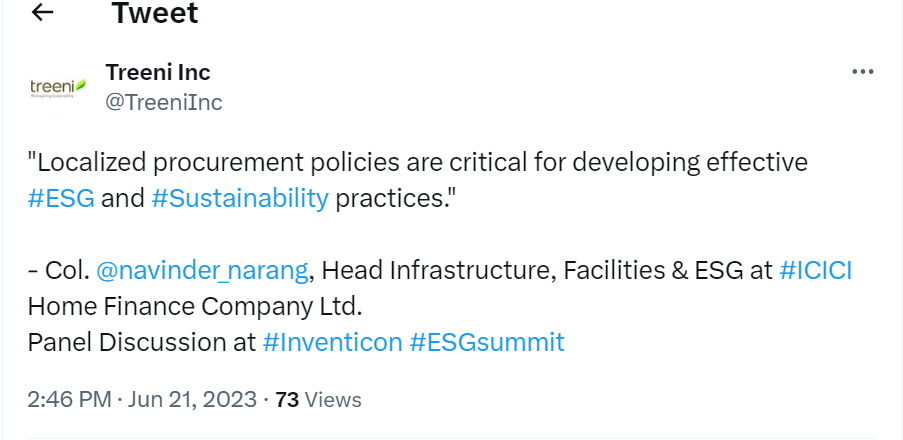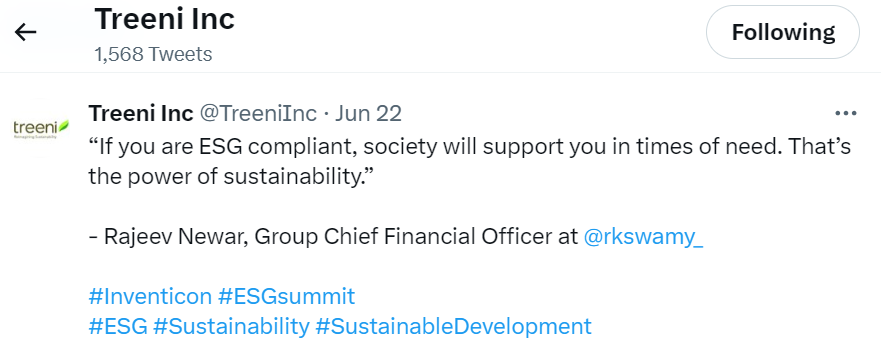Highlights from the 3rd ESG & Sustainability Strategy India Summit: Advancing Responsible Business Practices in India
05 July, 2023

In a significant gathering of industry leaders and experts, the 3rd ESG & Sustainability Strategy India Summit recently took place in Mumbai, providing a pivotal platform for discourse and collaboration. The event aimed to address challenges, showcase best practices, and explore regulatory guidelines and innovative approaches to sustainability. The summit witnessed the participation of some of the biggest companies in India such as ICICI Home Finance Company Ltd., Tata Steel Ltd., Larsen & Toubro Ltd., Mahindra Logistics Ltd., Bayer Group, Coca-Cola India, JSW Cement Ltd., Godrej Industries Group, and many others. By sharing their experiences, insights, and success stories, these companies contributed significantly to the collective knowledge and inspiration of the summit, further strengthening the collaborative efforts towards a more sustainable and responsible business landscape.
Treeni was a gold sponsor of the event. Our commitment to sustainability and responsible business practices aligns perfectly with the summit's objectives. As a strong advocate for knowledge sharing and collaboration, Treeni recognizes the importance of creating an ecosystem where expertise and insights can be shared to drive positive outcomes for all stakeholders.
3rd ESG & Sustainability Strategy India Summit
Integration of ESG and Sustainability: A Fundamental Imperative for Businesses
One resounding message echoed throughout the two-day gathering: ESG and sustainability cannot be mere add-ons or superficial initiatives but must be ingrained in the very DNA of companies. Industry leaders representing the biggest companies in India and worldwide emphasized that true goals and meaningful impact can only be achieved when businesses are built around ESG and sustainability principles. Monika Shrivastava, the Head of Sustainability at JSW Cement, aptly captured the essence of this transformation in her keynote address on day one. She stated that “embedding sustainability within a company's culture requires a deliberate and consistent effort. It cannot be achieved overnight but demands a strategic approach supported by well-defined policies.”
Speaking of strategically integrating ESG in every vertical of a business, Mayurika Chakraborty, Head HSSE & Business Compliance Ambassador, Maersk remarked, “Warehousing, distribution, cold storage, first mile, last mile... - logistics industry has the potential to incorporate ESG at every stage and make a huge positive impact.”
Col. Navinder Narang, Head Infrastructure, Facilities & ESG at ICICI Home Finance Company Ltd. shed light on using policies to stimulate ESG practices. "Localized procurement policies are critical for developing effective ESG and Sustainability practices." Narang continued, "By recognizing the importance of sourcing goods and services from local suppliers who adhere to sustainable practices, companies can make significant strides in their sustainability journey by reducing their Scope III emissions." By aligning policies with sustainable objectives, organizations can foster a culture that embraces sustainability across all functions, contributing to a more responsible and resilient business ecosystem.

Keeping an eye on SCOPE III
Dr Richa Gautam, Head- Sustainability & CSR at Mahindra Logistics stated "99.5% of emission for a logistic business comes from Scope III." Corporate India’s journey towards Net Zero cannot happen unless Scope III emissions are tackled was a clear message at the summit. The COVID-19 pandemic has prompted a paradigm shift in global supply chains. This change entails identifying and establishing new and/or alternative supply centres within the country and beyond and reducing the dependency on China. However, expanding and diversifying the global supply chain also presents challenges in terms of monitoring and managing Scope III emissions. Today, Scope III emissions are more complex and challenging to manage than ever before. These emissions extend beyond a company's direct control or influence and encompass a wide range of activities across the value chain and companies are looking at innovative ways to tackle them. Naresh Kumar Katakam, Lead Environmental & Sustainability at Larsen and Toubro shared how they are looking at converting some of their Scope III factors into Scope II. Giving an example, he shared, “At L&T we buy the fuel needed by our supplier to deliver the promised outcome. This quantity is determined through data analysis of past projects. The supplier has to deliver the project in the given fuel or pay for any additional purchase. By doing so, we are moving one of our Scope III unknowns to a predictable Scope I.” There was also a broad consensus that to manage and reduce Scope III emissions effectively, companies need to collaborate closely with their suppliers, customers, and stakeholders. This collaborative approach ensures a holistic view of the value chain and enables the identification of emission hotspots and opportunities for improvement. Thus to generate a larger, near-future impact - supply chain sustainability is the foremost actionable companies can look at.
Long-Term Vision - From Cost to Profit
Another key message that emerged from the gathering was that ESG practices should be viewed through a long-term lens, with a focus on sustainable outcomes rather than short-term gains. Embracing ESG principles can drive innovation, resilience, and competitiveness, contributing to both business success and positive societal impact. Devesh Ghuley, Corporate EHS Head at Everest Industries Ltd., proposed adopting a prevention-of-loss approach to raise corporate sentiment towards ESG. He urged the audience to consider the impact of ESG in terms of ROI conversions and encouraged capturing data on potential losses that companies may face if they fail to embrace ESG practices.
“Companies who treat ESG as a cost centre are unable to bring real impact. ESG should become a way of life,” added Rajeev Newar, Group Chief Financial Officer at R K Swamy Pvt Ltd. He further added, "If you are ESG compliant, society will support you in times of need. That’s the power of sustainability.”

Monika Shrivastava, the Head of Sustainability at JSW Cement shared a case study showcasing how JSW Cement used their ESG data to set up the entire cement division. JSW was a major supplier of steel slag to other cement manufacturers. Recognising the opportunity, JSW moved to create their cement setup thereby using waste from one setup as raw material for another. This has helped both companies with their ESG goals, circularity, and generating profits.
Key Takeaways: Data, Act, Gain
● Data makes decisions easy - Today it is easy to talk about the impact of climate change because we can study historical data. "The climate crisis is a culmination of understanding data going back 66 million years - Data is very critical in ESG!" - Akshay Kurian, Product Lead, Sustainable Innovation at Treeni Sustainability Solutions captured the sentiment emerging from the conference. With the entire supply chain being a global spectrum today, data comes from everywhere. These insights further reinforce the significance of accurate, reliable, and well-utilized data in driving ESG initiatives, empowering organizations to make impactful changes and achieve sustainable outcomes. Dr Yogesh D. Sonawane, Global Sustainability & Energy Lead at CBRE Group, emphasized the importance of “data assurance throughout the ESG process, as it instils confidence among stakeholders, especially new ones.” But it is not just about collecting data but also about utilizing it effectively. Getting the data right is pivotal in generating actionable insights and informed decision-making.
Akshay Kurian, Product Lead, Sustainable Innovation at Treeni Sustainability Solutions addressing the event
● Do what you can - The 3rd ESG & Sustainability Strategy India Summit saw a diverse audience, comprising representatives from both hard-to-abate industries and those still navigating the importance of ESG reporting in their respective sectors. While some companies showcased their well-integrated ESG practices, others were just beginning their journey. However, a resounding message emerged from the discussions - every company should do what they can. Regardless of the stage they are at, organizations must take proactive steps towards incorporating ESG principles into their business processes. The summit served as a platform for knowledge sharing, enabling companies to learn from each other's experiences and discover practical strategies for implementing sustainable practices. It emphasized that even incremental progress is valuable, and every small step contributes to the larger goal of building a more sustainable future.
● Financial benefits are aplenty - By embracing ESG practices and transparently reporting their performance, organizations open doors to a range of financial opportunities. Banks and financial institutions, for instance, increasingly consider ESG factors when evaluating loan applications, making it easier for companies with strong ESG credentials to access capital and secure favourable lending terms. Moreover, clients and customers are increasingly demanding suppliers and partners with robust ESG practices, creating a competitive advantage for companies that prioritize sustainability. By demonstrating a commitment to ESG, organizations can enhance their reputation, attract new clients, and negotiate better contracts. Additionally, governments are incentivising sustainable practices by offering benefits such as carbon credits, tax incentives, and grants to companies that actively contribute to environmental protection and resource conservation. ESG reporting, therefore, not only aligns businesses with responsible practices but also brings tangible financial benefits, enabling companies to thrive in an evolving landscape that values sustainability.
The 3rd ESG & Sustainability Strategy India Summit provided an enriching platform for experts in the field of ESG to converge, exchange knowledge, and explore strategies for advancing responsible business practices in India. From discussions on starting the ESG journey to understanding regulatory updates, the summit highlighted the significance of holistic approaches, collaboration, and transparent reporting. As India continues its path toward sustainable growth, this event catalysed fostering a more sustainable and responsible business ecosystem in the country. By supporting and actively participating in events like the 3rd ESG & Sustainability Strategy India Summit, Treeni exemplifies its dedication to fostering a sustainable and responsible business ecosystem, where organizations can learn, grow, and contribute to a better future. We will talk more about the emerging trends that the summit shed light on in our upcoming blogs.
About Treeni
Treeni has established product market fit with the resustain™ SaaS platform - the sustainability data baseline in resustain™ enables enterprises to define strategy, and a roadmap to achieve goals & targets.
The two platforms we offer include:
● resustain™ Enterprise: ESG data management, dashboards & insights, performance
management, and reporting platform for large global enterprises
● resustain™ SMB: Addresses the unmet need for ESG data & performance management, and the
ability to address customer demands for CDP, Ecovadis reporting in the SMB (small and
medium-sized business) segment
resustain™ was built in India and Treeni's consulting and implementation teams can deploy to clients anywhere in the world. This unique ability and access to a large pool of domain and technology skills allow us to promise clients the lowest total costs of ownership (TCO).
__________________________________________________________________________________________________________________________________________________

